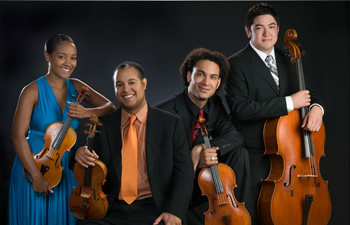What a refreshing change! The Raleigh Chamber Music Guild’s concert Sunday afternoon featured four works, only one of which was over 100 years old!
The four musicians making up the ensemble Antares – violinist Vesselin Gellev, cellist Rebecca Patterson, clarinetist Garrick Zoeter and pianist Eric Huebner – are at home with programs ranging from the 18th century to newly commissioned works. They have performed together extensively here and overseas, especially in South America, and it shows. Throughout the difficult and diverse program, the balance among the players was impeccable. Huebner even managed to rein in the loud and resonant Bösendorfer piano to keep it in line with the other instruments.
The program opened with Eclipse, a quartet for violin, clarinet, cello and piano composed in 1995 by American composer George Tsontakis (b.1951). The work was inspired by a lunar total eclipse he observed from his home in Shokan, NY and reflects more the mood of the composer as he watched the eclipse than an attempt to describe the astronomical event. The four short movements are particularly challenging for the clarinetist, and Zoeter has all the technical and musical tools to meet it. He managed to convey subtleties – and wide discrepancies – of mood with an amazing array of nuances of tones. (The movement titles range from “Haunting” to “Hyperactive” and “serene but disturbing” to “Manaical – Distant, Serene.”)
Next, Gellev, Patterson and Huebner tackled Beethoven’s Piano Trio in D, Op.70/1. This is a challenging work, especially its Largo second movement – perhaps the worlds first minimalist work. It consists of only a single theme that undergoes subtle changes over numerous repetitions, each of which promises, but never delivers, resolution. The performance, while intense and sensitively played, failed to convey the large architectonic structure of the movement. Nevertheless, the balance between the players was again exceptional.
Igor Stravinsky composed L’histoire du soldat in 1918 for narrator, two voices, violin, double bass, clarinet, bassoon, cornet, trombone and drums. Shortly thereafter he made an instrumental suite from the music, as well as a trio reduction of five movements for clarinet, violin and piano. The energetic performance of the trio caught the spirit of Stravinsky’s dabbling with jazz, new to Europe with the American “invasion” during and after W.W.I. Gellev’s violin was especially artful in contrasting the wistful soldier’s playing in “Le violon du soldat” and the diabolical in the “Danse du diable” – The Devil’s Dance.
The program concluded with another contemporary offering: Paul Moravec’s Tempest Fantasy for clarinet, violin, cello and piano, was composed in 2003 and awarded the Pulitzer Prize in Music this year. The Fantasy is a five-movement meditation – difficult to perform but easy to listen to – on the characters, moods and situations in Shakespeare’s play. Moravec caught the spirit of the play, especially the variety of gossamer textures in the Ariel movement and the clumping character of Caliban, for whom Zoester switched to the rumbling deep notes of the bass clarinet.
Antares constituted one of life’s rarities: a high quality bargain. Not only did we hear spectacular, energetic playing, but we got four major pieces rather than the usual three. Gee, thanks, Antares! You can come back any time. And by the way, when’s the CD of the Tempest Fantasy coming out?











